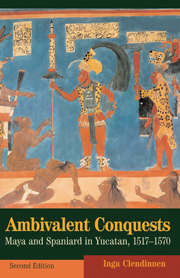Book contents
- Frontmatter
- Contents
- List of illustrations
- Preface to the second edition
- Preface to the first edition
- Acknowledgments
- Map I Yucatan in the conquest period
- Part I Spaniards
- Part II Indians
- Epilogue: Confusion of tongues
- Appendix: A sampler of documents
- Glossary of Spanish and Maya terms
- Notes
- Select bibliography
- Index
Preface to the second edition
Published online by Cambridge University Press: 05 October 2013
- Frontmatter
- Contents
- List of illustrations
- Preface to the second edition
- Preface to the first edition
- Acknowledgments
- Map I Yucatan in the conquest period
- Part I Spaniards
- Part II Indians
- Epilogue: Confusion of tongues
- Appendix: A sampler of documents
- Glossary of Spanish and Maya terms
- Notes
- Select bibliography
- Index
Summary
Ambivalent Conquests is now fifteen years old, which is elderly in the academic world. I will not try to locate it in regard to new developments in colonial studies in Yucatan or elsewhere, partly because history, especially regional history, moves slowly; more because it is a discrete study that aimed to shed a sharp light on one particular territory, and only diffuse light beyond.
Instead I offer a short history of the transformation of a great deal of reading, thinking, and rethinking into the book you are holding in your hands. (We know too little about the biography of books.) Ambivalent Conquests was my first book. Each book teaches the writer something new, but the first teaches you the most. It grew out of a post-graduate history thesis: an inquiry into Spanish actions in colonial Yucatan a couple of decades after conquest, with the focus on the ferocious inquisition into Indian ‘backsliding’ by Franciscan missionary friars, and the Spanish settlers' attempts to stop it. The thesis ended with the prim observation that, as we have only Spanish records to work from, the world of the Mayan Indians was and must remain closed to us. One of my examiners, a man of much insight and few words, pencilled in the margin: ‘Why?’. I was taken aback. Then I thought ‘Why indeed?’; read a great deal of Clifford Geertz and other selected anthropologists; returned to those Spanish records; and, four years of happy thinking later, completed the book with a third section devoted to reconstructing what the Indians might have been up to.
- Type
- Chapter
- Information
- Ambivalent ConquestsMaya and Spaniard in Yucatan, 1517–1570, pp. xiii - xivPublisher: Cambridge University PressPrint publication year: 2003

